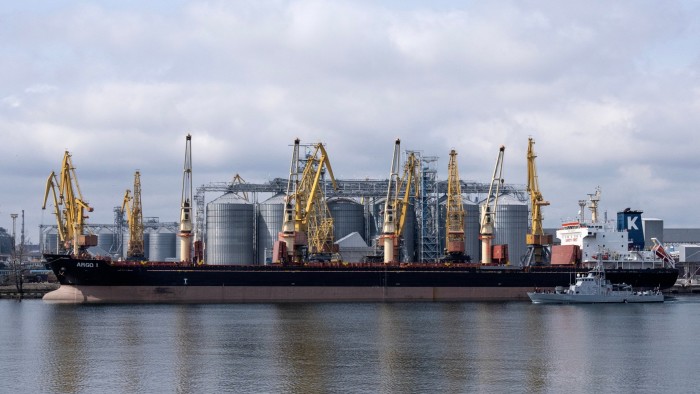Stay informed with free updates
Simply sign up to the War in Ukraine myFT Digest — delivered directly to your inbox.
US investors are relaunching a key Ukrainian grain export terminal after wresting control from alleged looters, in a test of Kyiv’s ability to attract capital to rebuild its economy in its fourth year of war.
US-based funds Argentem Creek Partners and Innovatus Capital Partners have taken over the Olimpex terminal in the port of Odesa, after securing victory in a saga of alleged loan fraud that underlines the challenges of reviving international investment in wartime Ukraine.
Sustained Russian attacks on infrastructure and fading hopes for a ceasefire this year are threatening to add to a reconstruction bill that the World Bank has already estimated at more than $500bn, versus Ukraine’s current GDP of about $200bn.
With official funding for Kyiv’s war effort increasingly uncertain, President Volodymyr Zelenskyy’s government is trying to persuade private investors to take on riskier projects, but he has to convince them Ukraine has legal protections and is winning an internal war on corruption.
Zelenskyy’s administration recently helped the two US funds enforce a $95mn debt against the Odesa tycoons who previously owned the terminal and defaulted on loans — and who in the chaos of Russia’s invasion allegedly misrepresented grain supposed to be held as collateral.
After the arrest in May of one of the businessmen, Volodymyr Naumenko, on charges of defrauding creditors, the Ukrainian supreme court on Wednesday signed off on a handover of a key asset of the terminal, which has an annual capacity of close to 5mn tonnes, making it one of the biggest in the country.
“Like in any emerging market, there are certain things you have to be prepared to deal with when they come at you,” said John Patton, partner at Argentem Creek. “But in Ukraine, even in the war, we have been able to follow through the rule of law. It’s taken longer, but we are getting there, and that has always been my thesis about Ukraine.”
The US funds previously won a $150mn international arbitration and several UK court rulings but had a long fight in Ukrainian courts before Wednesday’s handover.
“Our role in this case was purely coordinative — we drew the attention of the relevant authorities,” said Andriy Yermak, head of the Ukrainian president’s office. “This case is yet another confirmation that Ukraine is a rule-of-law state.”
“Ukraine has so much potential to attract investment but it has to shake off the reputation that doing business in Ukraine is high risk due to fraud,” said Carl Sturén, a veteran Swedish entrepreneur in Ukraine who will manage the grain terminal.
This case was important, Sturén added, because alleged “attempts to defraud US investors failed and those culpable are out of business.”
Prosecutors allege that GNT — Naumenko’s group that owned the terminal — defrauded Innovatus on a $20mn loan, in particular through a scheme that misrepresented the availability of grain as collateral, and then “simulated the destruction” of the allegedly spoiled product in the months after Russia’s invasion.
“The very first starting point of this was the disappearance of pledged grain . . . allegedly incinerated with a company that had never paid an electricity or gas bill, in Sumy — hundreds of miles away from Odesa, almost inside the war zone,” Patton said.
Ukrainian authorities have been fighting an illicit grain export trade. The country’s Bureau of Economic Security, an anti-corruption watchdog, has been investigating claims that the state lost billions of hryvnia in customs and tax revenue for its war effort because of so-called black grain.
Ukraine’s Security Service has led a crackdown in Odesa in the past year that significantly suppressed the trade, people familiar with the matter said.
“I think [Olimpex] was the centre of black grain in Odesa. It was one of the centres at least, probably the biggest one,” Patton said.
GNT has denied any wrongdoing and accused Argentem Creek of using the loans to mount a “hostile takeover” of the terminal, which the group tied up in the dispute by pledging it as security for loans from Ukrainian banks. In April a Ukrainian commercial court of appeal overturned the bank loan deals, paving the way for the US funds to take control.
Serhiy Groza, Naumenko’s partner in the GNT group which borrowed from the US funds, has told Ukrainian media that the case that led to Naumenko’s arrest was “fabricated” and “rests solely on the commands from above.”
GNT did not respond to a request for comment on the allegations.
Patton said he would like to relaunch the terminal “at some point in the summer”.
“It might be as late as September, but the crop season is now, so now is the time to get it up and running again,” he added.
This story has been amended since first publication to clarify that the Ukrainian supreme court signed off on a handover of a key asset of the terminal
https://www.ft.com/content/82091347-2637-4729-b025-931fccb8bc42


